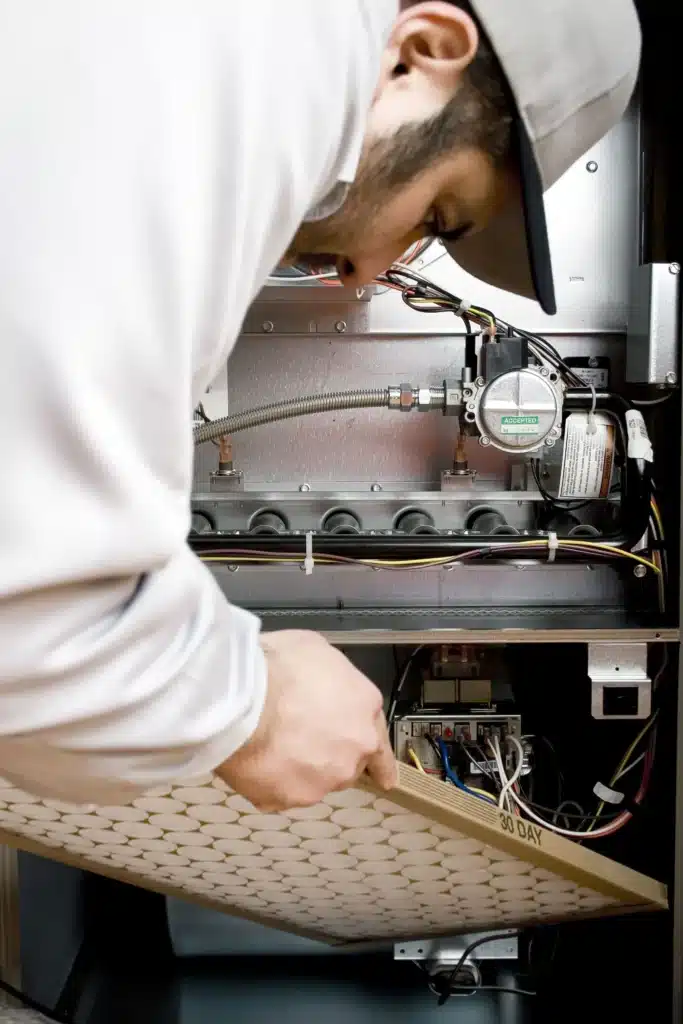Maximizing Furnace Efficiency: Tips for Lowering Energy Costs
Expert Tips

At Top Shelf Electric, Heating, & Plumbing, when we think about our Denver HVAC systems, one of the most critical aspects to consider is the efficiency rating of our furnace. These ratings, often expressed as Annual Fuel Utilization Efficiency (AFUE), provide us with a clear indication of how effectively our furnace converts fuel into heat. A higher AFUE percentage means that a greater portion of the fuel is being used for heating our homes, while a lower percentage indicates more energy waste.
For instance, a Denver furnace with an AFUE rating of 90% converts 90% of the fuel it consumes into usable heat, while the remaining 10% is lost through exhaust or other inefficiencies. Understanding these ratings helps us make informed decisions about our heating systems and can lead to significant savings on our energy bills.
Moreover, different types of Denver heating systems come with varying efficiency ratings. Gas furnaces typically have higher AFUE ratings compared to oil or electric models. This knowledge empowers us to choose the right type of furnace based on our specific needs and budget. Additionally, the age of a furnace is critical—older models often have lower efficiency ratings, which can lead to higher operational costs over time.
Key Takeaways
- Furnace efficiency ratings measure how effectively a furnace converts fuel into heat, with higher ratings indicating better efficiency.
- Regular maintenance and cleaning of a furnace can improve its efficiency and extend its lifespan.
- Upgrading to a high-efficiency furnace can result in significant energy savings and improved comfort.
- Using a programmable thermostat can help optimize energy usage and reduce heating costs.
- Proper insulation and sealing of a home can prevent heat loss and improve overall energy efficiency.
Regular Maintenance and Cleaning
Regular Denver furnace maintenance and cleaning are essential practices that can significantly enhance efficiency and longevity. Annual inspections with a qualified technician ensure the system is operating at peak performance. During inspections, the technician will clean burners, check the heat exchanger for cracks, and verify all components are functioning properly.
Changing or cleaning air filters every one to three months is one of the most effective ways to maintain efficiency. Clogged filters restrict airflow, forcing the furnace to work harder and consume more energy. Keeping the area around the furnace clear of dust and debris also helps maintain performance.
Upgrading to a High-Efficiency Furnace
Modern high-efficiency furnaces boast AFUE ratings of 90% or higher, meaning they convert a significant portion of fuel into heat while minimizing waste. While the upfront investment may be higher, long-term energy savings and increased comfort often outweigh the cost.
Many high-efficiency models include advanced features such as variable-speed blowers and modulating gas valves, which adjust output based on real-time heating needs. This ensures optimal comfort while reducing energy consumption and lowering your carbon footprint. Our team can perform furnace installation in Denver that you can rely on!
Using a Programmable Thermostat
Programmable thermostats allow homeowners to set specific temperatures for different times of the day, reducing unnecessary energy use. By lowering the temperature when the home is unoccupied or while sleeping, households can save 10–15% annually on heating costs. Smart thermostats offer additional benefits such as remote control, learning capabilities, and integration with other home systems.
| Metrics | Value |
|---|---|
| Energy Savings | 10-15% |
| Annual Cost Savings | $180 |
| CO2 Emissions Reduction | 1,500 pounds per year |
| Percentage of US Homes with Programmable Thermostats | 50% |
Proper Insulation and Sealing
Heat loss through walls, attics, windows, and doors can undermine the effectiveness of even the most efficient furnace. By investing in quality insulation and sealing gaps or leaks, homeowners can create a more energy-efficient environment that retains heat effectively. Attics, basements, and drafty windows are common culprits for energy loss. Addressing these areas reduces furnace workload and extends system life.
Utilizing Zone Heating
Zone heating in Denver allows homeowners to customize heat distribution by directing energy to occupied spaces while reducing output to unused rooms. Systems like ductless mini-splits or electric baseboard heaters make targeted heating possible, offering significant energy savings and convenience. Many zone heating systems also feature smart controls, enabling remote adjustments and scheduling.
Energy-Efficient Furnace Filters
High-efficiency furnace filters improve indoor air quality while ensuring optimal airflow. By regularly changing or cleaning these filters—typically every one to three months—homeowners can avoid restricted airflow that leads to increased energy use and system strain. Energy-efficient filters help furnaces operate smoothly while trapping dust, allergens, and contaminants.
Professional Energy Audit
A professional energy audit identifies areas of energy loss in the home. Trained specialists use tools like blower doors and thermal imaging cameras to locate leaks and insulation deficiencies. Recommendations from audits often include sealing, insulation upgrades, or system adjustments, leading to significant long-term savings and improved comfort.
Conclusion
By understanding furnace efficiency ratings, committing to regular maintenance, considering upgrades to high-efficiency models, using programmable thermostats, ensuring proper insulation, implementing zone heating, using energy-efficient filters, and scheduling professional energy audits, homeowners can significantly enhance furnace performance. These steps lower energy bills, extend system life, and create a more sustainable living environment.
Denver Furnace FAQs
What is furnace efficiency?
Furnace efficiency refers to the amount of heat produced by a furnace compared to the amount of fuel it consumes, measured as AFUE.
Why is maximizing furnace efficiency important?
Maximizing efficiency lowers energy bills, reduces environmental impact, and improves home comfort.
How can I maximize furnace efficiency?
Replace filters regularly, schedule professional tune-ups, seal leaks, and upgrade to a more efficient model when needed.
What are signs of an inefficient furnace?
Uneven heating, rising bills, frequent cycling, unusual noises, or visible soot/rust around the furnace.
What are additional tips for improving furnace efficiency?
Use programmable thermostats, add insulation, seal drafts, keep vents unobstructed, and use ceiling fans to circulate warm air.
Call Top Shelf Electric, Heating, & Plumbing for All Your Home Comfort Service Needs
Need reliable plumbing repairs, electrical upgrades, or heating and cooling service you can trust? Our experts at Top Shelf Electric, Heating & Plumbing help homeowners across Denver, Castle Rock, Colorado Springs, and the surrounding area stay comfortable year-round. Your home should always feel safe and well cared for, and we always make that our priority—treating your space and your time with respect during every visit we make.
Call us 24-hours a day for dependable home comfort service from a team that knows Colorado homes inside and out.
Call (720) 899-2633
